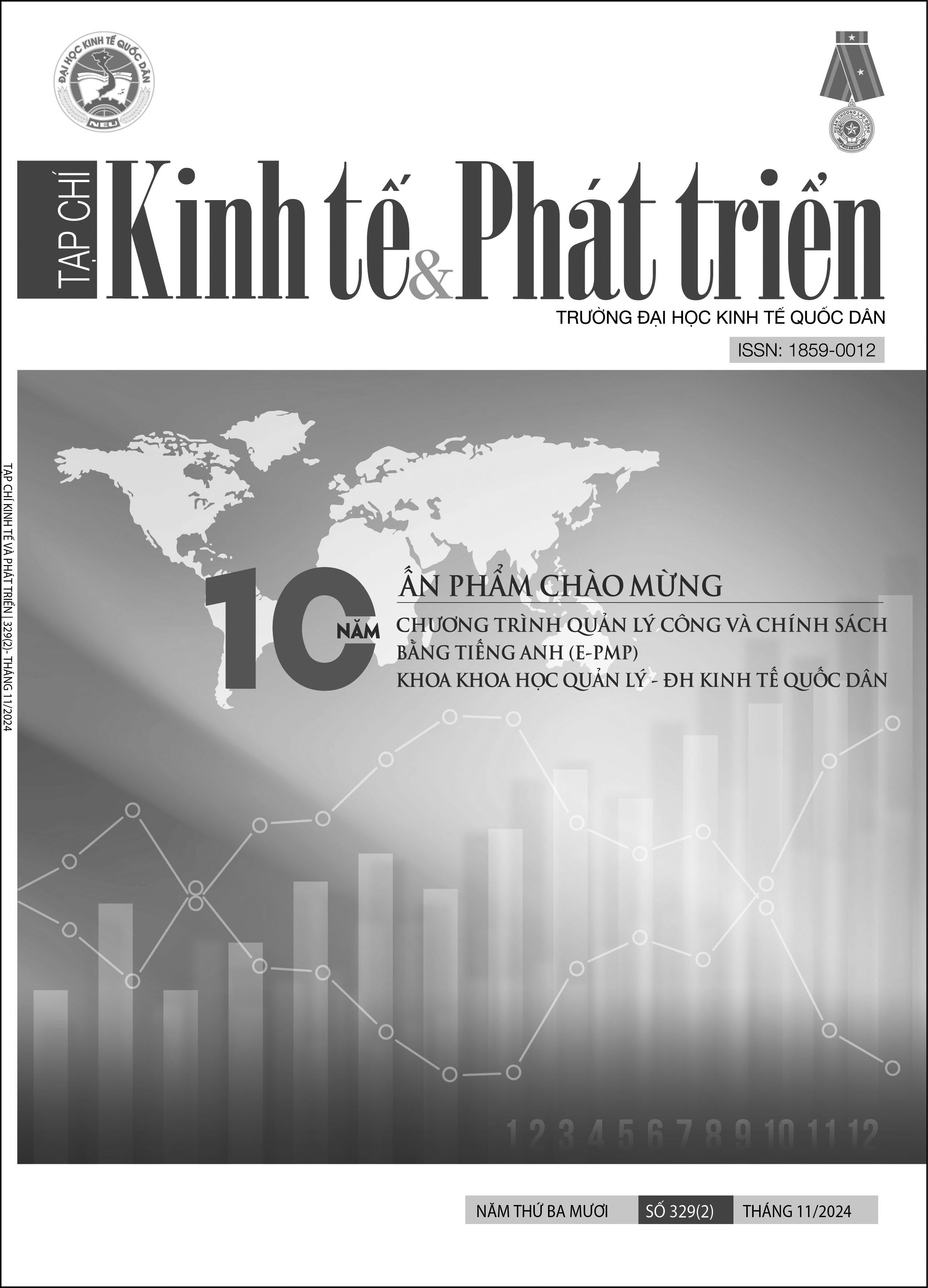Tác động của Fintech đến sức mạnh thị trường và hiệu quả tài chính của các ngân hàng tại Việt Nam
DOI:
https://doi.org/10.33301/JED.VI.1967Từ khóa:
Fintech, hiệu quả tài chính hoạt động, ngân hàng thương mại, sức mạnh thị trườngTóm tắt
Nghiên cứu này đánh giá tác động của sự phát triển số lượng các công ty Fintech tới sức mạnh thị trường và hiệu quả tài chính của các ngân hàng thương mại Việt Nam, bài báo dựa vào mô hình phân tích hồi quy tuyến tính (POLS) dựa trên dữ liệu theo năm của 22 Ngân hàng thương mại Việt Nam trong giai đoạn 2013-2022. Kết quả hồi quy cho thấy sự phát triển của Fintech ảnh hưởng tiêu cực lên cả sức mạnh thị trường của các ngân hàng và cả hiệu quả tài chính của ngân hàng trong giai đoạn này. Những phát hiện này có ý nghĩa quan trọng trong việc đưa ra các đề xuất chính sách nhằm khuyến khích ngân hàng đổi mới công nghệ và các chính sách trong phát triển, hợp tác của các công ty Fintech với ngân hàng thương mại.
Tài liệu tham khảo
Aaker, David A., & Kevin Lane Keller (1990), ‘Consumer evaluations of brand extensions’, Journal of Marketing 54, 27-41, DOI: 10.1177/002224299005400102.
Alhadeff, D. A. (1974), ‘Barriers to bank entry’, Southern Economic Journal, 589-603, DOI: 10.2307/1056377.
Alt, R., Beck, R., & Smits, M. T. (2018), ‘FinTech and the transformation of the financial industry’, Electronic markets, 28, 235-243, DOI: 10.1007/s12525-018-0310-9.
Aremu, M. A., Ekpo, I. C., Mustapha, A. M. (2013), ‘Determinants of banks’ profitability in a developing economy: evidence from Nigerian banking industry’, Institute of Interdisciplinary Business Research, 4(9), 155-181, DOI: 10.6007/IJAREMS/v2-i4/50.
Ariss, R. T. (2010), ‘On the implications of market power in banking: Evidence from developing countries’, Journal of banking & Finance, 34(4), 765-775, DOI: 10.1016/j.jbankfin.2009.09.004.
Ayaydin, H., & Karakaya, A. (2014), ‘The effect of bank capital on profitability and risk in Turkish banking’, International Journal of Business and Social Science, 5(1), 252-271.
Beck, T., De Jonghe, O., & Schepens, G. (2013), ‘Bank competition and stability: Cross-country heterogeneity’, Journal of financial Intermediation, 22(2), 218-244, DOI: 10.1016/j.jfi.2012.07.001.
Berger, A. N., Humphrey, D. B. (1997), ‘Efficiency of financial institutions: international survey and directions for future research’, European Journal of Operational Research, 98, 175-212, DOI: 10.1016/S0377-2217(96)00342-6.
Bilotta, N., & Romano, S. (2022), Tech giants in banking: The implications of a new market power, Istituto Affari Internazionali (IAI).
Brandl, B., & Hornuf, L. (2020), ‘Where did FinTechs come from, and where do they go? The transformation of the financial industry in Germany after digitalization’, Frontiers in Artificial Intelligence, 3, 511504, DOI: 10.3389/frai.2020.00008
Christensen, Clayton M. (2013), The innovator's dilemma: When new technologies cause great Firms to fail, Harvard Business Review Press.
De Guevara, J. F., & Maudos, J. (2007), ‘Explanatory factors of market power in the banking system’, The Manchester School, 75(3), 275-296, DOI: 10.1111/j.1467-9957.2007.01017.x.
Feyen, E., Frost, J., Gambacorta, L., Natarajan, H., & Saal, M. (2021), ‘Fintech and the digital transformation of financial services: implications for market structure and public policy’, BIS Papers, <https://ideas.repec.org/b/bis/bisbps/117.html>.
Garg, P., Gupta, B., Chauhan, A. K., Sivarajah, U., Gupta, S., & Modgil, S. (2022), ‘Measuring the perceived benefits of implementing blockchain technology in the banking sector’, Technological forecasting and social change, 163, 120407, DOI: 10.1016/j.techfore.2020.120407.
Gomber, P., Koch, J.-A., & Siering, M. (2017), ‘Digital finance and FinTech: Current research and future research directions’, Journal of Business Economics, 87(5), 537–580, DOI: 10.1007/s11573-017-0852-x.
Heffernan, S., & Fu, M. (2008), ‘The determinants of bank performance in China’, Available at SSRN 1247713, DOI: 10.2139/ssrn.1247713.
Hodula, M. (2022). Does Fintech credit substitute for traditional credit? Evidence from 78 countries. Finance Research Letters, 46, 102469, DOI: 10.1016/j.frl.2021.102469.
Hwang, J., & Shin, I. (2020), ‘The impact of Fintech on banks' performance: Evidence from Korea’, International Journal of Financial Studies, 8(2), 19.
Keeley, M. C. (1990), ‘Deposit insurance, risk, and market power in banking’, The American economic review, 1183-1200, <https://www.jstor.org/stable/2006769>.
Kerényi, Á., & Molnár, J. (2017), ‘The impact of the fintech phenomenon–radical change occurs in the financial sector?’, Financial and Economic Review, 16(3), 32-50.
Ky, S. S., Rugemintwari, C., & Sauviat, A. (2019), ‘Is fintech good for bank performance? The case of mobile money in the East African Community’, Available at SSRN, DOI: 10.2139/ssrn.3401930.
Naceur, S. B., Candelon, B., Elekdag, M. S. A., Elekdag, S., & Emrullahu, D. (2023), Is FinTech Eating the Bank's Lunch?, International Monetary Fund, DOI: 10.5089/9798400259692.001.
Navaretti, G. B., Calzolari, G., Mansilla-Fernandez, J. M., & Pozzolo, A. F. (2018), ‘Fintech and banking: Friends or foes?’, Available at SSRN, DOI: 10.2139/ssrn.3099337.
Ndwiga, D. (2020), The effects of Fintechs on bank market power and risk-taking behavior in Kenya (No. 44), Kenya Bankers Association (KBA), Nairobi, <https://www.econstor.eu/handle/10419/249545>.
Niu, Y. H., & Min, D. Y. (2015), ‘The influencing mechanism of Internet financialization on commercial bank’, Journal of Hebei University of Economics and Business, 36(3), 66-71.
Phan, D. H. B., Narayan, P. K., Rahman, R. E., & Hutabarat, A. R. (2020), ‘Do financial technology firms influence bank performance?’, Pacific-Basin finance journal, 62, 101210, DOI: 10.1016/j.pacfin.2019.101210.
Qi, H., Yang, K., & Wang, W. (2022), ‘Does FinTech change the market power of traditional banks in China?’, Journal of Business Economics and Management, 23(5), 1060-1083.
Rega, F. G. (2017), ‘The bank of the future, the future of banking-An empirical analysis of European banks’, Available at SSRN 3071742, DOI:10.2139/ssrn.3071742.
Restoy, F. (2021), Fintech regulation: how to achieve a level playing field, London: Financial Stability Institute, Bank for International Settlements.
Tarawneh, A., Abdul-Rahman, A., Mohd Amin, S. I., & Ghazali, M. F. (2024), ‘A Systematic Review of Fintech and Banking Profitability’, International Journal of Financial Studies, 12(1), 3, DOI: 10.3390/ijfs12010003.
Vives, X. (2019), ‘Competition and stability in modern banking: A post-crisis perspective’, International Journal of Industrial Organization, 64, 55-69, DOI: 10.1016/j.ijindorg.2018.08.011.
Wang, Y., Xiuping, S., & Zhang, Q. (2021), ‘Can fintech improve the efficiency of commercial banks?—An analysis based on big data’, Research in international business and finance, 55, 101338, DOI: 10.1016/j.ribaf.2020.101338.





